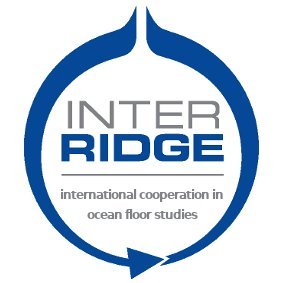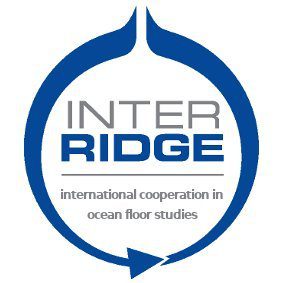InterRidge Fellows 2012
The InterRidge Student and Postdoctoral Fellowship Program continues to play an important role in the careers of early career ocean scientists. There was a high number of proposals submitted again this year and we awarded four InterRidge funded Fellowships, together with three Fellowship for students from developing countries, supported by the ISA Endowment Fund.
The recipients of this year’s InterRidge Fellowships is:
Catherine Cole (a PhD student at NOC Southampton, UK)
Emanuele Fontana ( a postdoctoral researcher from University of Milan, Italy)
Alessio Sanfilippo (a postdoctoral researcher at University of Pavia, Italy )
Jessica Till (a postdoctoral researcher studying at IMPMC, Paris, France)
InterRidge/ISA Endowment Fund Fellowships were awarded to:
Hanchao Jian (a PhD student at Peking University, Beijing, China)
Sanitha Sivadas (a postdoctoral researcher at NIO, India)
Andrew Thaler (a PhD student at Duke University, USA)
Catherine Cole (a PhD student at NOC Southampton, UK)
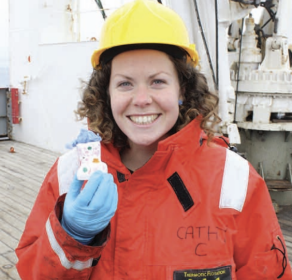
Cole is a PhD student at the National Oceanography Centre, Southampton, UK, and is supervised by Dr. Rachel James and Doug Connelly. She will visit both the research labs at LabHorta, University of the Azores, where she will work with Raul Bettencourt and Ines Martin, and the University of Nantes, where she will be sponsored by Richard Cosson. Her proposal is entitled: “When do essential metals turn toxic? A proteomic study of metal-induced oxidative stress on the hydrothermal vent-living mussel, Bathymodiolus aoricus“. Cole will examine how the presence of cadmium, a non essential, toxic metal, influences the mussel’s ability to tolerate elevated concentrations of essential metals, iron and copper. The build-up of metals in key tissues, and the production and activity of anti-oxidant enzymes will be quantified in response to controlled metal exposure. This will enhance current understanding of metal tolerance in these chemically extreme environments.
“I m doing a PhD in hydrothermal vent geochemistry and am eager to continue to broaden and expand my experience. This InterRidge Fellowship will give me the opportunity to learn new techniques in state-of-the-art molecular biochemistry within the unique research facilities of the University of the Azores and the University of Nantes. This will contribute crucially to my PhD and open a door into a new aspect of science with far-reaching applications”.
Emanuele Fontana (a post-doc at the University of Milan, Italy)
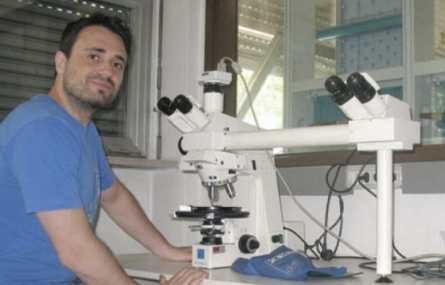
Fontana is a postdoctoral researcher at the University of Milan, working with Paola Tartarotti. He will travel to Williams College & Williams Mystic, Connecticut, USA, to study with Lisa Gilbert on a proposal: “Structural and petrophysical analysis of the lava/dike boundary at intermediate to superfast-spreading ocean crust: Integration between present-day ocean crust and ophiolites”. This project proposes a comparative analysis of data from Troodos ophiolites (Cyprus), DSDP/ODP Hole 504B, and ODP/IODP Hole 1256D. An integration of geophysical, petrographic, structural and microstructural data will provide insight into the roles of faulting and fracturing during crustal accretion and evolution of the oceanic crust, especially at the boundary between volcanics and sheeted dykes.
Since I remember I’ve been always fascinated by the curious and almost incredible opportunity to observe on land, or even on rugged mountains, what was long before formed on the ocean floor: the ophiolites. These rocks contain the history of planet Earth and express all its strength. The InterRidge Fellowship gives me the opportunity to study and compare the ocean relict, still preserved in the ophiolites, with present day seafloor rocks. Somehow, it will be like brining back these old rocks, which have been travelling for a long time, to their original environment”.
Alessio Sanfilippo (a post-doc at the University of Pavia, Italy)
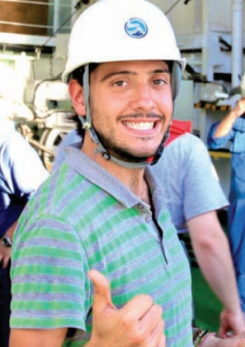
Sanfilippo is studying the petrological processes controlling the first phases of generation of the lower oceanic crust, tracking the minerals’ chemical evolution from the mantle to the primitive gabbroic rocks, together with Prof. R. Tribuzio and Dr. M. Tiepolo at the University of Pavia. Sanfilippo will take part in a scientific cruise to the Mid Atlantic Ridge and he will work with Dr. Henry Dick at the Woods Hole Oceanographic Institution, USA. His proposal is entitled: “The role of the melt supply variability in the development of a detachment fault system”.
“I have always been attracted by the complexity of the geological processes constraining the formation of the oceanic crust at spreading ridges. The detachment faults are an important component of lithospheric creation along oceanic ridges and provide windows into the oceanic lithosphere. The InterRidge Fellowship will enable me to take part in a research cruise to study the role of magmatism in the development of a detachment faulting system at the Mid Atlantic Ridge. I am excited by the possibility of sampling portions of the lower oceanic crust and mantle, constraining the deep processes that generate the detachment faulting”.
Jessica Till (a post-doc at IMPMC, Paris, France)
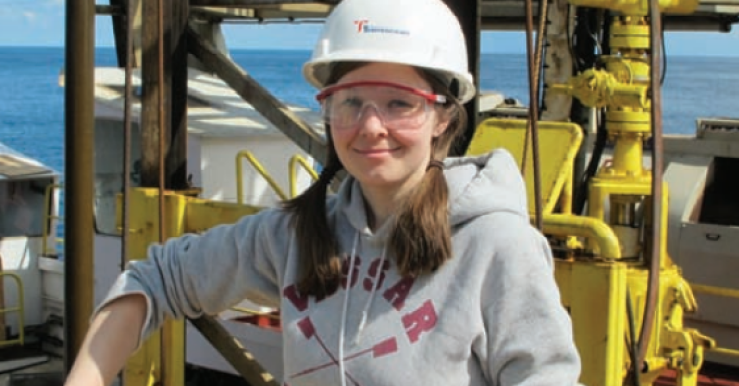
Till received her PhD from the University of Minnesota in 2011 and has participated in an IODP drilling expedition to sample lower crustal rocks in superfast spreading crust. She will visit Imperial College, London, UK to work with Dr. Adrian Muxworthy on her Fellowship proposal: “Quantification of Fe-oxide exsolution microtextures in silicates to constrain cooling history at a superfast spreading ridge”. Currently she holds a postdoctoral post at IMPMC, Paris, working with Dr. Yohan Guyodo.
“The lower oceanic crust is an exciting frontier in ocean research and the microscopic Fe-oxide mineral intergrowths that occur throughout the lower crust have interested me for years. The InterRidge Fellowship gives me a great opportunity to investigate the origins of this intriguing mineralogical system. Their textures could provide a wealth of information about magma emplacement mechanisms and thermal history at ocean ridges”.
Sanitha Sivadas (a post-doc at NIO, India)
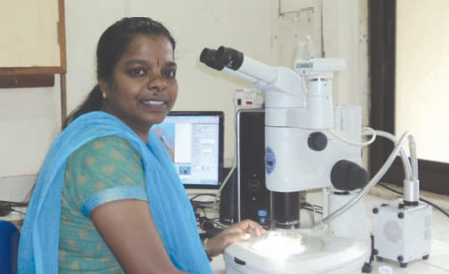
Sivadas is presently a CSIR-Research Associate at the Biological Oceanography Division, National Institute of Oceanography, Goa, India, working with Dr. Baban Ingole.
Her proposal title is: “Functional diversity of the benthic community from hydrothermal vent regions”. The shallow water hydrothermal vents are considered to be “hot spots” of biodiversity. The discovery of minerals in the hydrothermal vents, depletion of resources on land and growing demand has resulted in increased interest for mining this fragile and unique ecosystem. However, the exploitation of resources will have significant impact on the vent biodiversity. Most of the studies on the vent communities are focused on the structural diversity.
Studies on the biodiversity-ecosystem functioning and the influences of environmental parameters are few. Understanding the role of biodiversity in ecosystem functioning is important for protection and management of vent ecosystem.
“My research to data has focused on the role of macrobenthos in the ecosystem functioning of coastal habitat and evaluating its usefulness for environmental monitoring. Though hydrothermal vent research is relatively new to me, the InterRidge/ISA fellowship gives me an opportunity to join one of the most experienced researchers in the field of vent ecology, Dr. Ana Colaco, and study the benthic diversity-ecosystem functioning of shallow water vents in the Azores, Portugal. Effective management of marine habitats requires assessing the link between biodiversity and ecosystem functioning. Limited study has been carried out from the hydrothermal vents of Indian Ocean; the expertise gained during the fellowship will help to study the Indian Ocean hydrothermal vent community”.
Andrew Thaler (a PhD student at Duke University, USA)
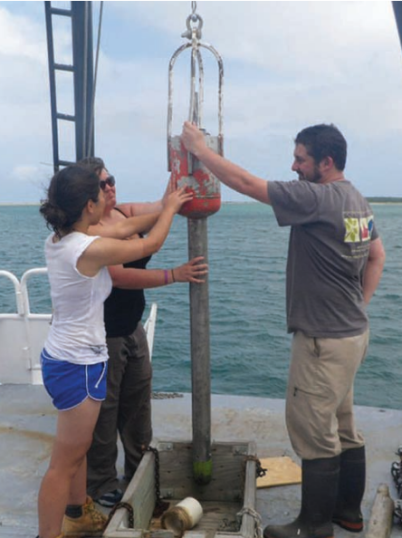
In 2012, Mr. Freddie Alei, will enrol on a 5-week summer course at Duke University Marine Lab, to study conservation and management. Thaler will serve as his research mentor, training him in molecular approaches to ecology and population genetics at hydrothermal vents, and developing his professional skills. The objective of this proposal is to support a capstone experience for Mr. Alei, to present the results of his research at the 13th International Deep-Sea Biology Symposium in Wellington, New Zealand. Here he will increase his knowledge of deep-sea ecosystems and tools of environmental management and network with potential future collaborators and employers.
Thaler’s proposal: “Capacity building: Training and professional development for a visiting scholar from Papua New Guinea” is supported by his advisor, Prof. Cindy Van Dover, based at Duke University Marine Lab, NC, USA. Thaler wrote: “I’ve always felt strongly what we should ensure that the knowledge we gain benefits the nations we work in, especially when our research takes us to developing countries. This InterRidge/ISA fellowship will help me train a visiting student from Papua New Guinea, Freddie Alei, and develop and enhance international collaborations.
